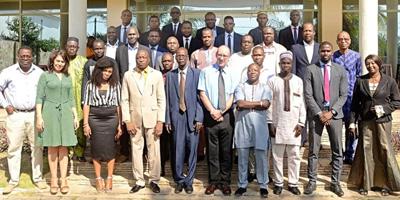The Central Bank of West African States congratulates West African partners as they share results of their second full survey on international trade in services.
An investment in building stronger statistical technical capacity by member states of the West African Economic and Monetary Union (UEMOA) has resulted in improved collection and analysis.
This bodes well for the region as they level up their analytical capacity to survey international trade in services.
The results of UEMOA’s second survey on international trade in services were presented at a workshop jointly hosted by UNCTAD and the UEMOA Statistical Commission in Lome, Togo from 9 to 11 December.
The goal was to compare and analyze the results which showed not only sectoral totals but also intra- and extra- bilateral trade flows and trade by mode.
UEMOA member states demonstrated a stronger technical capacity running the second full survey compared to the previous survey.
National Statistical Institutes have not only managed the administrative and technical aspects of the survey process well but have also recruited and trained experts and statisticians to ensure high-quality results.

The UEMOA Statistical Commission expressed satisfaction with the Acte Communitaire prepared by UNCTAD. But Namaro Yago, UEMOA’s director of statistics, said “it will take some time before we can implement this act”.
Meanwhile, the Central Bank of West African States and the Union (BCEAO) noted that the aggregates compare favorably with their Balance of Payments estimates, which lends credibility to both versions of the estimates.
Good progress being made
The regional workshop brought together the key regional players, including, representatives from UNCTAD, the UEMOA statistical commission, the Economic Community of West African States (CEDEAO), and representatives of the National Statistical Institutes, the BCEAO, and the ministries of commerce from each of the eight member states.
“Everyone that should be here, is here,” said Steve MacFeely, UNCTAD's head of statistics and information.
The UEMOA member States also expressed their satisfaction with the training on trade-in-services statistics they had received using UNCTAD’s e-learning platform.
Senegal noted they had used this course to train all their field staff who conducted the survey. Several representatives said it would be useful to take the training again or enroll other National Statistical Institutes agents on the course.
To ensure the continuity and sustainability of the ongoing project for the following years, the UEMOA member states discussed the memorandum that is being prepared pertaining to the collaboration of different partners in conducting the survey.
The memorandum highlights the responsibility of each partner as well as their role for the next surveys.
Future challenges
UNCTAD presented some alternatives for imputing missing values, treating non-response and weighting the population. UNCTAD highlighted the urgent need to have as complete and up-to-date business register as possible, stressing that every extrapolation technique will be based on detailed population information from which the sample is taken. In particular main activities/sectors and their size are important.
“Every extrapolation and imputation methodology relies on a detailed understanding of the universe of companies,” added Mr. MacFeely.
The UEMOA statistical commission and UNCTAD also discussed and invited member states to report on detailed sampling techniques used for both, the first and the second survey.
They stressed the necessity of considering a common core of enterprises in the sample for the two surveys to achieve a consistent time series.
UNCTAD also provided recommendations and options for the very challenging task of measuring the travel sector.
Mr. Yago welcomed UNCTAD recommendations and invited member states to provide a complete inventory of available sources of data on travel services.
He highlighted the challenges countries face regarding intra-regional trade of travel services, which is mainly provided by road mode.
The commission mentioned the possibility of annexing a specific module to collect travel services data, in the next household living condition survey. UNCTAD also outlined plans to develop both methodology and a database, in partnership with UEMOA member states and BCEAO, to address freight costs.
On the issue of intra-regional asymmetries, Mr. MacFeely said once the surveys bed down, “a coordinated approach to intra-regional asymmetries might be adopted”.
The project now moves to the last and most challenging phase – to build an information technology statistical system that all member states would use to compile and disseminate their statistics.



